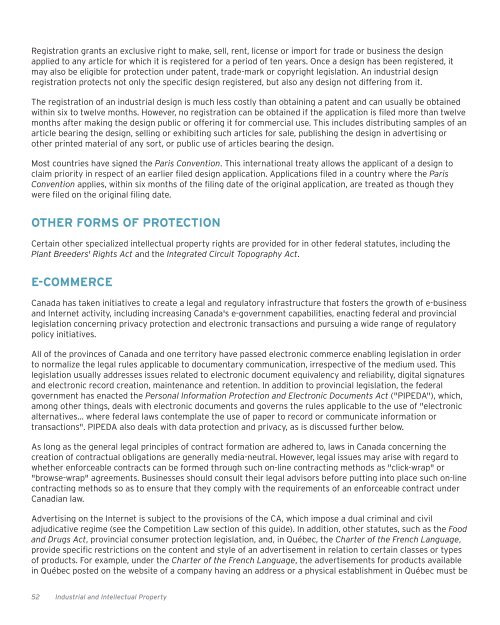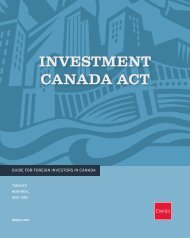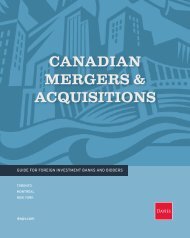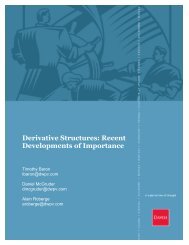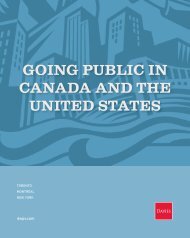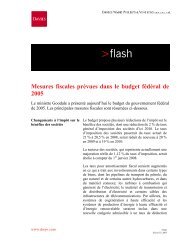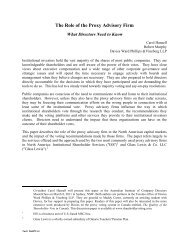• adequate and effective remedies aga<strong>in</strong>st persons who tamper with electronic rights management<strong>in</strong>formation (e.g., <strong>in</strong>formation which identifies the work, the author of the work, the owner of any right<strong>in</strong> the work, etc.) without authority or who copy works know<strong>in</strong>g that electronic rights management<strong>in</strong>formation has been removed or altered without authority.DOMAIN NAMESThe Canadian Internet Registration Authority ("CIRA") is responsible for the ".ca" system, which is governed byCanadian law. The ".com" doma<strong>in</strong> name system, which designates commercial activities, is governed andmanaged by the United States under American law.In order to be eligible to register a ".ca" doma<strong>in</strong> name, "Persons", <strong>in</strong>clud<strong>in</strong>g both private <strong>in</strong>dividuals andcompanies, need first to meet certa<strong>in</strong> Canadian presence requirements. These <strong>in</strong>clude hold<strong>in</strong>g Canadiancitizenship or permanent resident status <strong>in</strong> the case of <strong>in</strong>dividuals, and be<strong>in</strong>g <strong>in</strong>corporated under the laws ofCanada or any of Canada's prov<strong>in</strong>ces or territories, <strong>in</strong> the case of companies. This is done to ensure that the".ca" doma<strong>in</strong> names rema<strong>in</strong> a public resource for Canadians' social and economic development. A Person whichdoes not meet these Canadian presence requirements, but which nonetheless owns a registered trade-markunder Canada's Trade-marks Act, may also register for a ".ca" doma<strong>in</strong> name provid<strong>in</strong>g that the doma<strong>in</strong> nameconsists of or <strong>in</strong>cludes the exact word component of that registered trade-mark.Registration is on a "first-come first-served" system which no longer requires evidence of entitlement to aproposed doma<strong>in</strong> name. However, entitlement to a doma<strong>in</strong> name can be contested by a third party based on theexistence of prior rights. Canadian companies and Canadian <strong>in</strong>dividuals are free to register as many doma<strong>in</strong>names as they wish.In order to register a doma<strong>in</strong> name, the applicant must conduct a search to ensure that the chosen doma<strong>in</strong>name is available and that it has the right to use the doma<strong>in</strong> name, that the registration or use of the doma<strong>in</strong>name does not violate any third party's <strong>in</strong>tellectual property rights or other rights, does not defame any personand does not contravene any applicable laws. CIRA ma<strong>in</strong>ta<strong>in</strong>s a "WHOIS" look-up system permitt<strong>in</strong>g applicants toquery the ".ca" database to determ<strong>in</strong>e if a specific doma<strong>in</strong> name is available. Furthermore, all doma<strong>in</strong> nameregistration must be filed through a CIRA-certified registrar, who acts on behalf of the applicant.Registration of a ".ca" doma<strong>in</strong> name does not give the registrant any additional rights, other than, possibly,common law trade-mark rights that may exist or be created through commercial use of the doma<strong>in</strong> name,beyond the mere right to use the name as a doma<strong>in</strong> name.CIRA has a dispute resolution policy that regulates doma<strong>in</strong> name conflicts and has the power to transfer orcancel doma<strong>in</strong> names.INDUSTRIAL DESIGNThe federal Industrial Design Act provides an exclusive right to exploit orig<strong>in</strong>al design features. "Industrialdesign" generally refers to the aesthetic properties of an article, such as a pattern, shape and configuration, asopposed to its function.In order to be registrable, the design must be applied to a useful article, have a fixed appearance and be visibleat the time of purchase or dur<strong>in</strong>g normal use.Both Canadian and non-Canadian owners of designs can register them with CIPO.Industrial and Intellectual Property 51
Registration grants an exclusive right to make, sell, rent, license or import for trade or <strong>bus<strong>in</strong>ess</strong> the designapplied to any article for which it is registered for a period of ten years. Once a design has been registered, itmay also be eligible for protection under patent, trade-mark or copyright legislation. An <strong>in</strong>dustrial designregistration protects not only the specific design registered, but also any design not differ<strong>in</strong>g from it.The registration of an <strong>in</strong>dustrial design is much less costly than obta<strong>in</strong><strong>in</strong>g a patent and can usually be obta<strong>in</strong>edwith<strong>in</strong> six to twelve months. However, no registration can be obta<strong>in</strong>ed if the application is filed more than twelvemonths after mak<strong>in</strong>g the design public or offer<strong>in</strong>g it for commercial use. This <strong>in</strong>cludes distribut<strong>in</strong>g samples of anarticle bear<strong>in</strong>g the design, sell<strong>in</strong>g or exhibit<strong>in</strong>g such articles for sale, publish<strong>in</strong>g the design <strong>in</strong> advertis<strong>in</strong>g orother pr<strong>in</strong>ted material of any sort, or public use of articles bear<strong>in</strong>g the design.Most countries have signed the Paris Convention. This <strong>in</strong>ternational treaty allows the applicant of a design toclaim priority <strong>in</strong> respect of an earlier filed design application. Applications filed <strong>in</strong> a country where the ParisConvention applies, with<strong>in</strong> six months of the fil<strong>in</strong>g date of the orig<strong>in</strong>al application, are treated as though theywere filed on the orig<strong>in</strong>al fil<strong>in</strong>g date.OTHER FORMS OF PROTECTIONCerta<strong>in</strong> other specialized <strong>in</strong>tellectual property rights are provided for <strong>in</strong> other federal statutes, <strong>in</strong>clud<strong>in</strong>g thePlant Breeders' Rights Act and the Integrated Circuit Topography Act.E-COMMERCECanada has taken <strong>in</strong>itiatives to create a legal and regulatory <strong>in</strong>frastructure that fosters the growth of e-<strong>bus<strong>in</strong>ess</strong>and Internet activity, <strong>in</strong>clud<strong>in</strong>g <strong>in</strong>creas<strong>in</strong>g Canada's e-government capabilities, enact<strong>in</strong>g federal and prov<strong>in</strong>ciallegislation concern<strong>in</strong>g privacy protection and electronic transactions and pursu<strong>in</strong>g a wide range of regulatorypolicy <strong>in</strong>itiatives.All of the prov<strong>in</strong>ces of Canada and one territory have passed electronic commerce enabl<strong>in</strong>g legislation <strong>in</strong> orderto normalize the legal rules applicable to documentary communication, irrespective of the medium used. Thislegislation usually addresses issues related to electronic document equivalency and reliability, digital signaturesand electronic record creation, ma<strong>in</strong>tenance and retention. In addition to prov<strong>in</strong>cial legislation, the federalgovernment has enacted the Personal Information Protection and Electronic Documents Act ("PIPEDA"), which,among other th<strong>in</strong>gs, deals with electronic documents and governs the rules applicable to the use of "electronicalternatives… where federal laws contemplate the use of paper to record or communicate <strong>in</strong>formation ortransactions". PIPEDA also deals with data protection and privacy, as is discussed further below.As long as the general legal pr<strong>in</strong>ciples of contract formation are adhered to, laws <strong>in</strong> Canada concern<strong>in</strong>g thecreation of contractual obligations are generally media-neutral. However, legal issues may arise with regard towhether enforceable contracts can be formed through such on-l<strong>in</strong>e contract<strong>in</strong>g methods as "click-wrap" or"browse-wrap" agreements. Bus<strong>in</strong>esses should consult their legal advisors before putt<strong>in</strong>g <strong>in</strong>to place such on-l<strong>in</strong>econtract<strong>in</strong>g methods so as to ensure that they comply with the requirements of an enforceable contract underCanadian law.Advertis<strong>in</strong>g on the Internet is subject to the provisions of the CA, which impose a dual crim<strong>in</strong>al and civiladjudicative regime (see the Competition Law section of this guide). In addition, other statutes, such as the Foodand Drugs Act, prov<strong>in</strong>cial consumer protection legislation, and, <strong>in</strong> Québec, the Charter of the French Language,provide specific restrictions on the content and style of an advertisement <strong>in</strong> relation to certa<strong>in</strong> classes or typesof products. For example, under the Charter of the French Language, the advertisements for products available<strong>in</strong> Québec posted on the website of a company hav<strong>in</strong>g an address or a physical establishment <strong>in</strong> Québec must be52 Industrial and Intellectual Property
- Page 1 and 2: DOING BUSINESSIN CANADAYOUR COMPLET
- Page 3 and 4: ONTENTSTABLE OF CONTENTSINTRODUCTIO
- Page 5 and 6: IntroductionPOLITICAL AND CONSTITUT
- Page 7 and 8: 5RealEstateIndustrial and Intellect
- Page 9 and 10: accordance with directions from the
- Page 11 and 12: TITLE INSURANCE, TITLE OPINIONS AND
- Page 13 and 14: 11EnvironmentalLawIndustrial and In
- Page 15 and 16: commercial activities, or carrying
- Page 17 and 18: The federal government currently re
- Page 19 and 20: 17Types ofBusiness OrganizationIndu
- Page 21 and 22: provincial law cannot do so as of r
- Page 23 and 24: partnership, limited partners’ li
- Page 25 and 26: parties. In Québec, joint venturer
- Page 27 and 28: 25Financing aBusiness OperationIndu
- Page 29 and 30: The Civil Code of Québec provides
- Page 31 and 32: 29CorporateGovernanceIndustrial and
- Page 33 and 34: Instrument 58-101. The practices re
- Page 35 and 36: 33CompetitionLawIndustrial and Inte
- Page 37 and 38: BID-RIGGINGBid rigging is any agree
- Page 39 and 40: anticompetitive agreements among co
- Page 41 and 42: 39ForeignInvestmentIndustrial and I
- Page 43 and 44: apply for Canadian citizenship. (Pe
- Page 45 and 46: (D)GENERAL REVIEW THRESHOLDSThe fol
- Page 47 and 48: there be an "acquisition of control
- Page 49 and 50: Industrial and Intellectual Propert
- Page 51: to perform or cause them to be perf
- Page 55 and 56: PIPEDA applies in all provinces of
- Page 57 and 58: Employment LawCanadian employment l
- Page 59 and 60: displacement, laying-off, suspensio
- Page 61 and 62: easonable cause to believe that the
- Page 63 and 64: 63Retirement Plans, EmployeeBenefit
- Page 65 and 66: • funding;• eligibility;• pen
- Page 67 and 68: 67Temporary Entry andPermanent Resi
- Page 69 and 70: INTERNATIONAL AGREEMENTSIn recent y
- Page 71 and 72: immigrant in another class, he or s
- Page 73 and 74: 73Bankruptcy andInsolvency Proceedi
- Page 75 and 76: BANKRUPTCYBankruptcy results in the
- Page 77 and 78: INTERNATIONAL BANKRUPTCYASSETS LOCA
- Page 79 and 80: Tax ConsiderationsThis chapter prov
- Page 81 and 82: TAX REPORTINGAnnual Tax ReturnsCana
- Page 83 and 84: Québec has legislation that limits
- Page 85 and 86: Amendments, SIFTs and their unithol
- Page 87 and 88: Conversely, where a Canadian reside
- Page 89 and 90: A person, whether resident in Canad
- Page 91 and 92: APPENDIX I: CANADA’S IN FORCE TAX
- Page 93: TORONTODAVIES WARD PHILLIPS & VINEB


